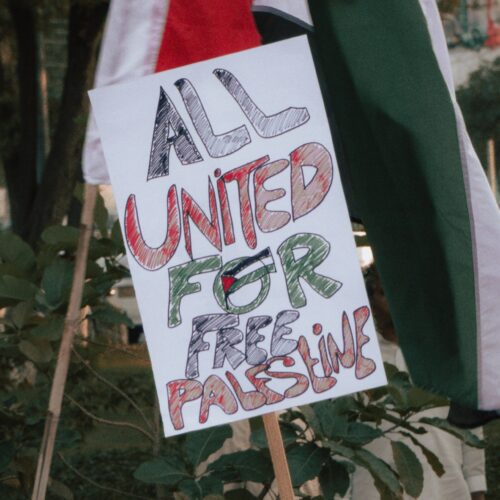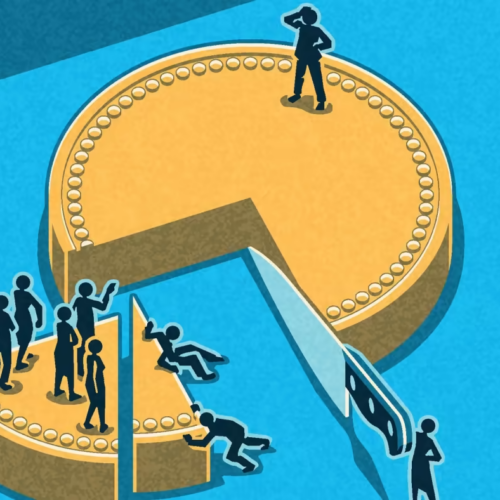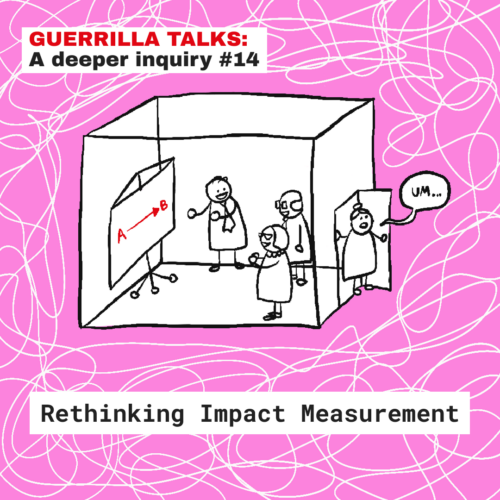* a Serbian version of this article is available at the bottom of this page
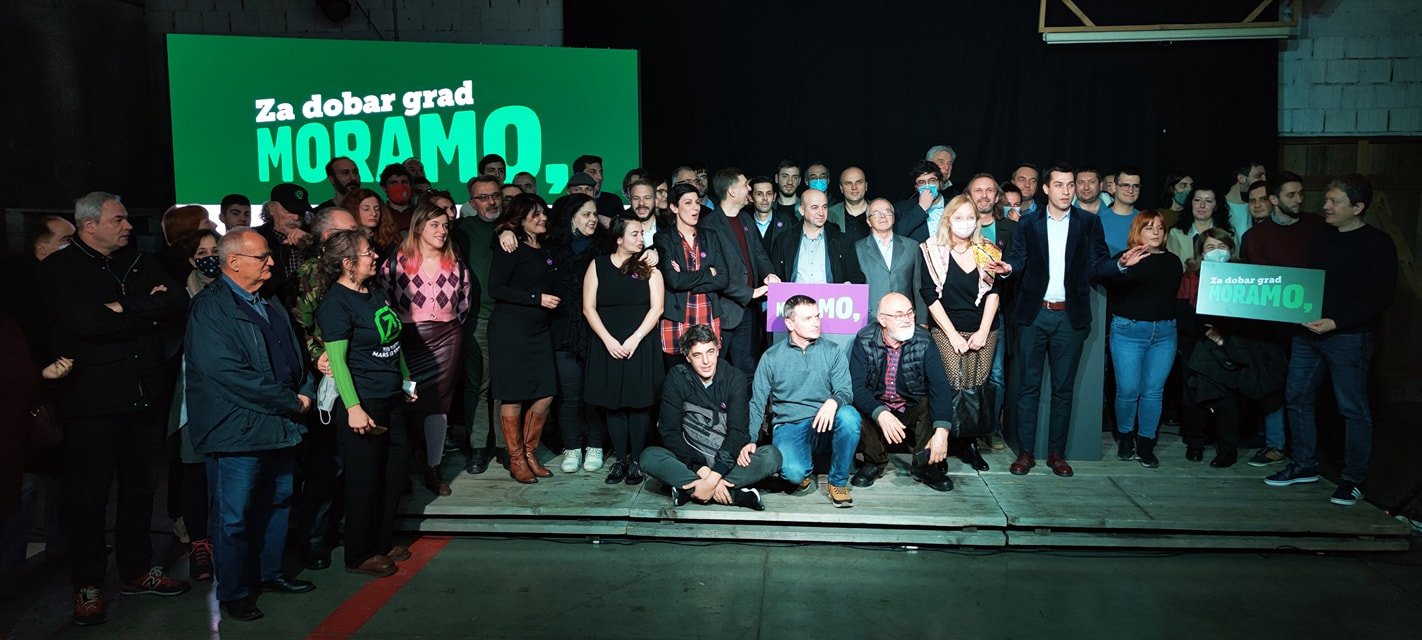
Over the previous decade, the Serbian capital Belgrade has been a center of politics that, in the first place, puts the interests of political and economic elites over those of its citizens. Emphasizing particular private interests over public interests has led to a continuous increase of corruption, alienation of public services through public-private partnerships, neglect of environmental issues, and attack on public spaces, urban centers, and common infrastructure. One such project that serves as a paradigm of corruptive and non-transparent procedures is the Belgrade Waterfront which was planned to give a new identity to the city. The project, started in 2014, implied transforming part of the city center by building a 2-million square meters luxury commercial-residential complex and extremely high Dubai-style tower. The Belgrade Waterfront project was followed by a lack of transparency, controversial foreign investors, false financial promises by the authorities, conflict with the law, and usurpation of the state institutions.
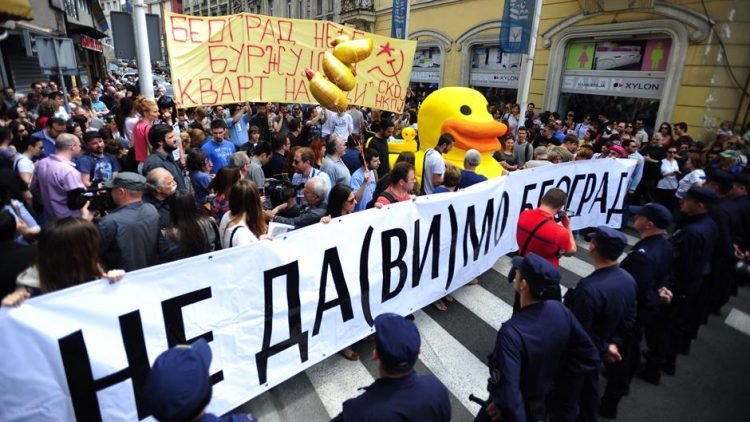
However, this project also had some side effects which back then, prime minister Vucic and his regime did not expect – it gave birth to the movement “Ne davimo Beograd” (eng. Don’t Let Belgrade Drown, abbr. NDM BGD), which organized the first mass mobilization against the regime. Since then, Ne davimo Beograd has come a long way, developing from a several-people-organized activist initiative to a green-left political movement with around 4000 members fighting for a different vision of Belgrade in which core is public interest tied to people.
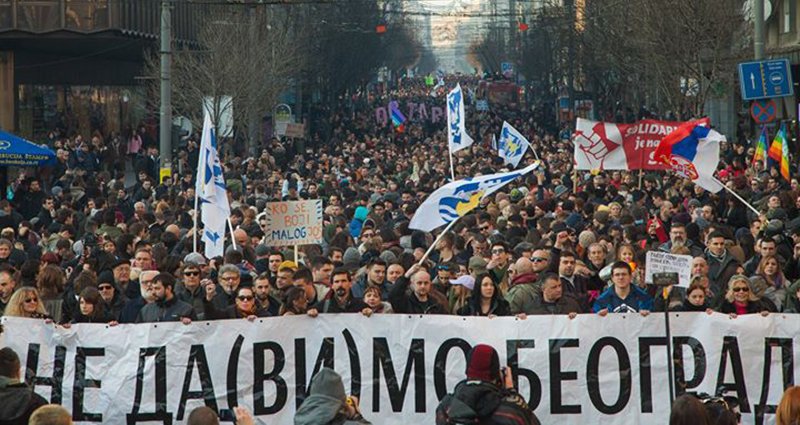
The political context in Serbia is far away from the friendly environment for opposition actors to compete and challenge president Vucic’s and Serbian Progressive Party’s (SNS) regime. The character of the regime in Serbia can be defined as competitive authoritarianism, characterized by formal democratic procedures and a democratic façade but filled with authoritarian rule. The image of Serbia today is one of almost total media control, pressure on voters in the public sector to vote for the ruling parties, erasing the borders between the state, governing party, and criminal structures, and brutal propaganda against critical voices.
Moreover, we evidence the increasing concentration of wealth within a small group of elites and growing income inequality in the country, one of the highest in Europe. This trend additionally negatively affects the Serbian society, which is already profoundly polarized over multiple lines such as pro and against the regime, traditionalism versus modernism, and West or Russia. Nowadays, in Serbia, people have a high level of mistrust in political institutions as they feel political elites betrayed them too many times. In such a social environment characterized by an anesthetized hope, it is hard to be a political actor and gain credibility for political activism.

Nonetheless, there is hope on the other side of the political spectrum. Ne davimo Beograd has grown into an antipode to established politics and a force with the potential to transform an authoritarian and unjust system. It has developed bottom-up activism as its trademark to answer undemocratic and particular interests-focused politics. The movement has built a strong connection with people by being at every place in Belgrade where public interest was in danger – whether those were protection of green areas, parks, housing, workers’ rights, cultural institutions, or rising against controversial construction projects. As means to address social problems, Ne davimo Beograd’s grassroots activists stood with the people, integrated them into broader political processes, and offered concrete solutions for concrete problems in the city and their communities. The movement has brought a new approach into a vicious circle of Serbian politics marked by a continuous shift of elites that look only upon their interest. Participation, solidarity, and green politics are three ideological pillars of the movement which became recognizable among people.
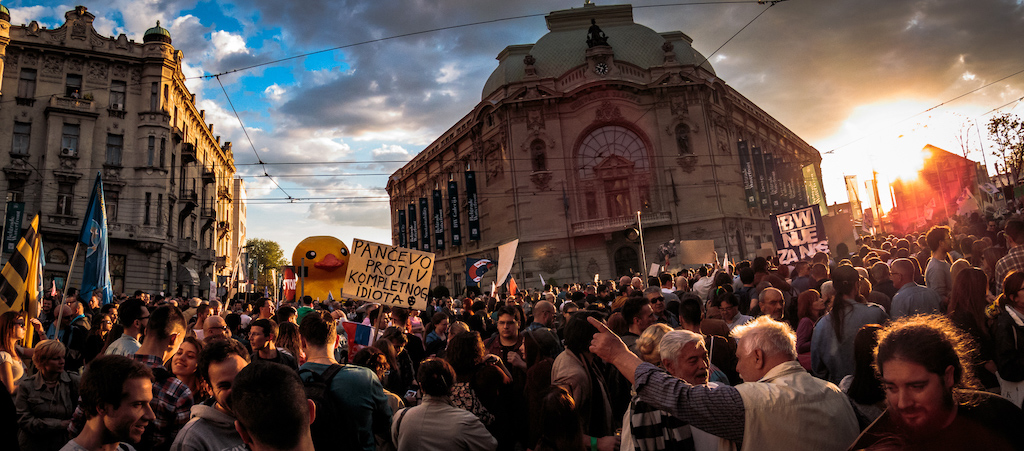
NDM BGD is also known for nurturing participative and inclusive internal democracy as opposed to established practice within the majority of political parties in Serbia. Some of the bodies that are part of the movement’s structure include a Small council, as an executive body consisting of five members, a Big council that gathers coordinators of all thematic and territorial groups, a Political council, and the Assembly as the largest body of the movement, gathering all members and making final political decisions. Deliberative process between and within these bodies is essential and an unavoidable aspect of Ne davimo Beograd’s internal organization.
Namely, the movement recently announced to run in the upcoming elections for the Belgrade city parliament, which are to be held in spring 2022. This decision came as the result of the process in which movements members took part and made a final decision. Such a democratic approach shows the capacity of this political organization to oppose rooted decision-making processes that include the small and limited circles of elite groups deciding on any political move.

Ne davimo Beograd represents a real political alternative to the deeply established approach to politics in Serbia. Fighting for the transformation of a system that does not work in the interests of its citizens is by some considered radical. These groups are mostly the ones that exploit its benefits and would be endangered when changes come. In this case, being radical is not only positive and welcoming, it is necessary.
This article was first published on TheRadicals.org
/ / /
SERBIAN VERSION
Transformacija sistema: nova nada za Srbiju
Glavni grad Srbije Beograd je tokom prethodne decenije bio centar politike koja je na prvo mesto stavljala interese političkih i ekonomskih elita nasuprot interesu građana. Naglašavanje partikularnih privatnih interesa nasuprot javnom interesu dovelo je do kontinuiranog povećanja korupcije, otuđenja javnih usluga kroz javno-privatna partnerstva, zanemarivanje ekoloških problema, kao i napade na javne prostore, urbane centre i infrastrukturu. Projekat „Beograd na vodi“ predstavlja paradigmu koruptivnih i netransparentnih procedura koji je planiran s ciljem da da novi identitet gradu. Projekat koji je počeo 2014. godine podrazumeva transformaciju gradskog centra izgradnjom luksuznog poslovno-stambenog kompleksa od dva miliona kvadrata i ekstremno visoku kulu nalik na kulama u Dubaiu. „Beograd na vodi“ je pratio manjak transparentnosti, kontroverzni strani investitori, lažna ekonomska obećanja od strane vlasti, kršenje zakona i, na kraju, uzurpacija državnih institucija.
Ipak, ovaj projekat je imao i određene nuspojave koje tadašnji premijer Vučić i njegov režim nisu očekivali – nastao je pokret “Ne davimo Beograd” (NDM BGD) koji je organizovao prve masovne proteste protiv režima. Od tada, Ne davimo Beograd je prošao dug put razvijajući se od aktivističke inicijative koja je okupljala nekolicinu ljudi do zeleno-levog pokreta sa oko 4000 članova koji se bore za drugačiju viziju Beograda u čijem centru se nalazi javni interes vezan za građane.
Politički kontekst u Srbiji podrazumeva daleko od prijateljskog okruženja za opozicione aktere da se takmiče i izazivaju režim predsednika Vučića I Srpske napredne stranke (SNS). Karakter režima u Srbiji se može definisati kao kompetitivni autoritarizam, koji odlikuje postojanje formalnih demokratskih procedura i demokratske fasade, a koje su zapravo ispunjene autoritarnim sadržajem. Slika današnje Srbije pokazuje skoro potpunu medijsku kontrolu, pritisak na birače u javnom sektoru da glasaju za vladajuće stranke, brisanje granica između države, vladajuće stranke i kriminalnih struktura, i brutalna propaganda protiv kritičkih glasova.
Povrh toga, svedočimo povećanom gomilanju bogatstva unutar malih elita i rastućoj dohodovnoj nejednakosti u zemlji, koja se po ovoj stopi nalazi u samom vrhu Evrope. Ovaj trend dodatno negativno utiče na srpsko društvo koje je već duboko polarizovano na osnovu nekoliko linija podela, uključujući biti za ili protiv režima, tradicionalizam nasuprot modernizmu i Zapad ili Rusija. Danas ljudi u Srbiji imaju visok nivo nepoverenja u političke institucije jer osećaju da su ih političke elite previse puta izneverile. U takvom društvenom okruženju koje karakteriše anestezirana nada, teško je biti politički akter i steći kredibilitet za politički aktivizam.
Ipak, postoji nada na drugoj strani političkog spektra. Ne davimo Beograd je izrastao u antipod etabliranoj politici i snagu sa potencijalom za transformaciju autoritarnog i nepravednog sistema. Razvijen je aktivizam „odozdo“ kao zaštitni znak i odgovor na politike koje su nedemokratske i fokusirane na partikularne interese. Pokret je izgradio čvrstu vezu sa narodom tako što je bio svuda gde je javni interes bio ugrožen – bez obzira da li se radilo o zaštiti zelenih površina, parkova, prava na stanovanje, radničkih prava, kulturnih institucija ili borbe protiv kontroverznih građevinskih projekata. Kao sredstvo za rešavanje društvenih problema, „grassroots“ aktivisti Ne davimo Beograd su stajali uz ljude, integrisali ih u šire političke procese i ponudili konkretna rešenja za konkretne probleme u gradu i njihovim zajednicama. Pokret je uveo novi pristup u politici začaranog kruga u Srbiji koju odlikuje neprestana smena elita koje se brinu samo za sopstveni interes. Participacija, solidarnost i zelene politike su tri ideološka stuba pokreta koji je postao prepoznatljiv među ljudima.
NMD BGD je takođe poznat po negovanju participativne i inkluzivne interne demokratije nasuprot ukorenjenoj praksi među većinom političkih stranaka u Srbiji. Neka od tela koja su deo strukture pokreta su Malo veće, kao petočlano izvršno telo, zatim Veliko veće koje okuplja koordinatore svih tematskih i teritorijalnih grupa, Politički savet, kao i Skupština kao najveće telo pokreta koje okuplja sve članove i članice i donosi konačne političke odluke. Takođe, neizostavan i esencijalan deo organizacije predstavljaju deliberativni procesi unutar i između ovih organa. Naime, pokret je nedavno doneo odluku da učestvuje na izborima za Skupštinu grada Beograda koji će biti održani na proleće 2022. Ova odluka je doneta kao rezultat procesa u kojem su članovi i članice pokreta učestvovali i doneli finalnu odluku. Takav demokratski pristup pokazuje potencijal ove političke organizacije da se suprotstavlja ukorenjenim procesima donošenja odluka koji obuhvataju mali i ograničeni krug elita koji odlučuju o svakom političkom potezu.
Ne davimo Beograd predstavlja istinsku političku alternativu duboko uspostavljenom pristupu politici u Srbiji. Borba za transformaciju sistema koji ne funkcioniše u korist sopstvenih građana neki smatraju radikalnom. Ove grupacije čine uglavnom oni koji eksploatišu beneficije tog sistema i koji bi bili ugroženi onog trenutka kada promena bude došla. U ovom slučaju, biti radikalan nije samo pozitivno i dobrodošlo, ono je neophodno.

